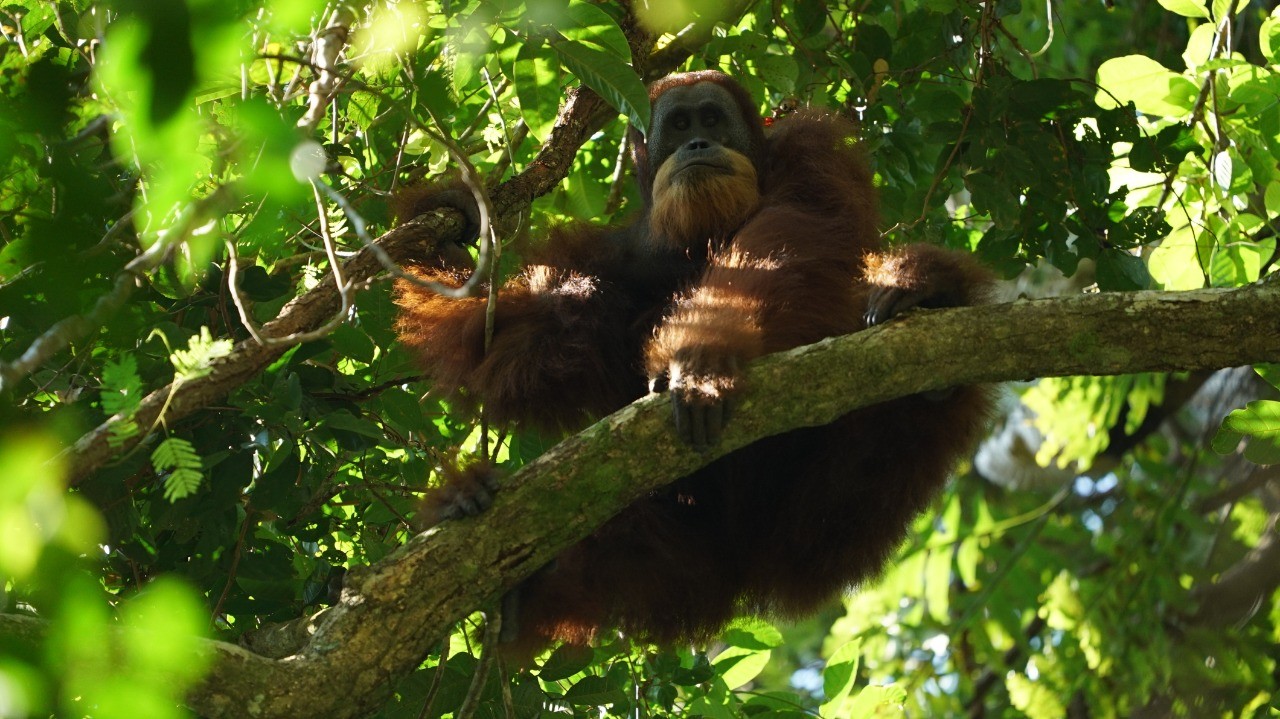Popular Reads
Top Results
Can't find what you're looking for?
View all search resultsPopular Reads
Top Results
Can't find what you're looking for?
View all search resultsTapanuli orangutan released after entering village in search of food
The BKSDA said the 35-year-old male orangutan had not disturbed anyone and had only taken fruits from local orchards.
Change text size
Gift Premium Articles
to Anyone
A
35-year-old male Tapanuli orangutan has been released in a nature reserve in North Sumatra after he entered a residential area in the province’s Padang Bulan hamlet in South Tapanuli on Sunday to gather fruit.
The North Sumatra Natural Resources Conservation Agency (BKSDA) gave the 63 kilogram orangutan an anesthetic because he became aggressive as the team sought to remove him. They later released the animal in the Dolok Sipirok nature reserve.
“A day after we evacuated the Tapanuli orangutan from the residential area, we released him into his habitat after a team of doctors declared him healthy,” BKSDA official Gunawan Alza told The Jakarta Post on Tuesday.
The orangutan was released near Aek Latong hamlet, about 4 kilometers from where he was captured.
Gunawan said the ape had not disturbed anyone and had only taken fruits from local orchards.
According to the BKSDA, Tapanuli orangutans frequently enter residential areas, especially those with fruit trees, to look for food. Many orangutans roam near Marsada village, which is close to an orangutan habitat in the Batang Toru block.
“There are approximately 400 to 600 Tapanuli orangutans in the Batang Toru block,” Gunawan said, adding that the orangutans in the area had been involved in previous conflicts with humans when the animals entered nearby villages.
Read also: Leonardo DiCaprio shows support for Sumatran orangutan conservation program
In 2019, the BKSDA found a malnourished and injured Tapanuli orangutan named Paya near a community plantation in Aek Batang village, Sipirok district. Some residents had allegedly tortured the orangutan.
After undergoing treatment for two months at the Batu Mbelin Sumatran Orangutan Rehabilitation Center (PKOS) in Sibolangit, Deli Serdang, the orangutan, which was also 35 years old, was released in the Dolok Sibual-buali conservation area in December.
The Tapanuli orangutan is the most recently taxonomized great ape species. It was discovered by a group of Indonesian and foreign researchers in 2017. The population of the species, Pongo Tapanuliensies, is estimated at around 800.
The species is only found in the Batang Toru ecosystem, which is a virgin forest with an area of 133,841 hectares, stretching across three regencies of North Sumatra, namely South Tapanuli, North Tapanuli and Central Tapanuli.
Experts fear that the Tapanuli orangutan is facing an increased risk of extinction because of the destruction of its natural habitat triggered by economic activity in the Batang Toru ecosystem.
PanEco Foundation conservation director Ian Singleton said that some 3,600 of the 105,000 hectares of Tapanuli orangutan habitat in the Batang Toru ecosystem had been damaged since 2001.
“Around 200 hectares of orangutan habitat are being damaged due to economic activities every year. This is a serious threat to Tapanuli orangutan breeding in the Batang Toru ecosystem,” Singleton told the Post recently.
He expressed concern that food sources for the Tapanuli orangutan in the ecosystem would disappear in the next five to 10 years. (syk)










